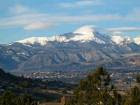 Here are some news items and reports over the last week that caught my attention and some brief reactions to them. The big news overall last week was the conducting of the Democratic National Convention in Denver last week and the accompanying speeches, activities, and sights. Most other news focused on the upcoming GOP convention in St Paul; the expectation of the arrival of another monster hurricane, Gustav, into New Orleans and the Gulf Coast and preparations and reactions to the looming disaster; and the start of the 2008 College Football season across the nation.
Here are some news items and reports over the last week that caught my attention and some brief reactions to them. The big news overall last week was the conducting of the Democratic National Convention in Denver last week and the accompanying speeches, activities, and sights. Most other news focused on the upcoming GOP convention in St Paul; the expectation of the arrival of another monster hurricane, Gustav, into New Orleans and the Gulf Coast and preparations and reactions to the looming disaster; and the start of the 2008 College Football season across the nation.-
A. Lake Powell Rebounds
-
It is good to hear the preeminent recreation site in the Southwest is on the rebound. I hope to return to the big lake someday as it is truly a spectacle and a great place to relax and play.
-
http://www.nytimes.com/2008/08/24/us/24powell.html?_r=1&ref=todayspaper&oref=slogin
-
*****
-
B. National Climate Atmosphere Laboratory News
-
This federal laboratory facility is still slated to be moved to Cheyenne in the next few years in spite of its current fiscal problems, which will come to a quick end once the Obama administration replaces the heads in the sand Bush junta. The mission of and experiments that occur in this laboratory are critical for the future of mankind and society.
-
http://www.trib.com/articles/2008/08/24/news/wyoming/56ca46d139d94857872574ae0074660d.txt
-
*****
-
C. Desert tortoises
-
A serious effort will need to be made in very due time in order to preserve these gentle creatures whose habitat is quickly disappearing which threatens the very existence of the species. Legal efforts and land preservation will be essential to prevent the possible looming extinction of this remarkable land reptile.
-
http://www.denverpost.com/news/ci_10292721
-
*****
-
D. Intrigue of Nuclear Espionage
-
This is a very interesting read, and expect it to be into a film in coming years.
-
http://www.nytimes.com/2008/08/25/world/25nuke.html?em=&pagewanted=all
-
*****
-
E. Obama and the Economy
-
The more one reads the details of the Obama economic strategy, the more it seems like the right course of action and the best that can be achieved at this time. It is far from perfect and leaves a lot to be desired, but its about the best that can be hoped for in the current environment that exists and will continue to for at least the next few years.
-
http://www.nytimes.com/2008/08/24/magazine/24Obamanomics-t.html?em=&pagewanted=all
-
*****
-
F. JFK nomination speech at LA Coliseum
-
A look back to an event in history that is largely unremembered today.
-
http://www.footballstadiumdigest.com/news/index.html?article_id=251
-
*****
-
G. The Empty Vacant Baseless American Economy
-
The cold hard truth on what the nation's economy is all about now, and what the consequences are for all of us very soon and in the long run.
-
http://www.tnr.com/politics/story.html?id=947bf9e5-923b-409a-adac-579658c99ddf
-
*****
-
H. Wind Transmission Outlook
-
It is essential to see efforts continue to increase transmission infrastructure across the entire Rocky Mountain Front from Montana south through Wyoming and Colorado and on into New Mexico and Texas as quickly as possible to get the use of wind power generated electricity into the pipeline. Adjacent states in the High Plains such as the Dakotas, Nebraska, Kansas, and Oklahoma also need to be included in these efforts. Enough wind exists to generate all the electricity needs of the entire region and beyond, and placing infrastructure in the next several years will optimize and maximize the exploitation of this renewable and nonpolluting energy source.
-
http://www.billingsgazette.net/articles/2008/08/27/news/wyoming/28-windpower.txt
-
*****
-
I. The Start of Instant Replay in Baseball
-
It is long past due, as it should have been in place even before 1996 when that punk Jeffrey Maier interfered with a ball in play which led to a colossal blown umpire's call by Rich Garcia against the Baltimore Orioles in game one of the ALCS at Yankee Stadium which led to a New York victory in both the game and eventually in the series.
-
http://hosted.ap.org/dynamic/stories/B/BBO_INSTANT_REPLAY?SITE=MTBIL&SECTION=SPORTS&TEMPLATE=DEFAULT
-
*****
-
J. Latest National Census Findings
-
The bottom line in these findings is that incomes for American citizens working has seen a blatant decline in the last eight years if figures from Americans older than age 65 are factored out.
-
http://www.usatoday.com/news/nation/census/2008-08-26-income-side_N.htm?loc=interstitialskip
-
http://krugman.blogs.nytimes.com/2008/08/27/stagnation-nation/#comments
-
http://krugman.blogs.nytimes.com/2008/08/26/about-that-bush-boom/
-
http://krugman.blogs.nytimes.com/2008/08/30/how-important-is-social-security/
-
*****
-
K. Destroy All Mullets !
-
There are a lot of ugly hairstyles being by worn by men (why men would want to have an exotic or outre hairstyle is totally beyond me) but perhaps the mullet is worst of all. Lets hope someday this hairstyle completely disappears from the face of the earth like the doo wop and ducktail have.
-
http://seattletimes.nwsource.com/html/localnews/2008145946_kitsapmullet28m.html
-
*****
-
L. The Growing Expense of NonConference Football Opponents
-
This is an interesting and educational read. I look for many conferences to add another conference game to replace these expensive nonconference games, like the Pacific Ten Conference has by going to a nine game conference schedule in the last two years.
-
http://www.desmoinesregister.com/apps/pbcs.dll/article?AID=/20080824/SPORTS020502/808240355
-
*****
-
M. The Fatal Flaws of Unrestrained Absolutist Market Corporate Capitalism
-
The cold hard facts and the ugly truth about what the real price of our recent economic obsession is.
-
http://www.alternet.org/story/92426/the_u.s._economy_is_socialism_for_the_rich/--middle
-
*****
-
N. The Ongoing Effort to Exterminate the Middle Class
-
Yet another consequence of the national obsession with Absolutist Free Market Corporate Capitalism.
-
http://www.alternet.org/workplace/92431/america%27s_middle_class_can%27t_take_much_more_punishment/
-
*****



















